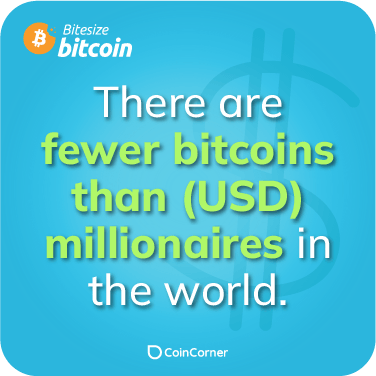How many millionaires are there compared to bitcoins?

As of October 2023, there are fewer Bitcoins than USD millionaires in the world. This fact illustrates the scarcity of Bitcoin and its potential as a store of value and digital asset. Here's an explanation of this concept:
1. Bitcoin's Fixed Supply:
Bitcoin is designed with a limited and fixed supply. There will only ever be 21 million Bitcoins in existence. This scarcity is programmed into the Bitcoin protocol and makes it different from traditional fiat currencies, which can be printed without limit.2. Scarcity and Digital Gold:
Bitcoin's scarcity is often compared to precious metals like gold. The limited supply creates an environment where demand for Bitcoin can drive up its price, especially when investors view it as a hedge against inflation and economic uncertainty.3. The Number of Millionaires:
The number of USD millionaires in the world is influenced by various factors, including economic conditions, wealth distribution, and investment opportunities. There are relatively more USD millionaires compared to Bitcoins, given that Bitcoin's supply is capped at 21 million.4. Bitcoin's Subdivisibility:
Bitcoin is highly divisible. Each Bitcoin can be divided into 100 million smaller units called satoshis. This divisibility makes it possible for individuals to own and use small fractions of a Bitcoin, making it accessible to a wide range of investors.5. Wealth Distribution:
Bitcoin's fixed supply and the fact that it is held by a relatively small number of individuals and institutions mean that the distribution of Bitcoin wealth is uneven. Some early Bitcoin adopters and institutional investors hold a significant portion of the supply.6. Diverse Ownership:
While Bitcoin is associated with a select number of wealthy individuals, it is also owned by a diverse global community, including retail investors, tech enthusiasts, and people from various backgrounds. This diverse ownership reflects Bitcoin's appeal as a borderless and decentralized asset.7. Changing Landscape:
The number of USD millionaires and the dynamics of Bitcoin ownership are subject to change over time. Market conditions, regulations, and adoption trends can influence these numbers.Share this fact:





